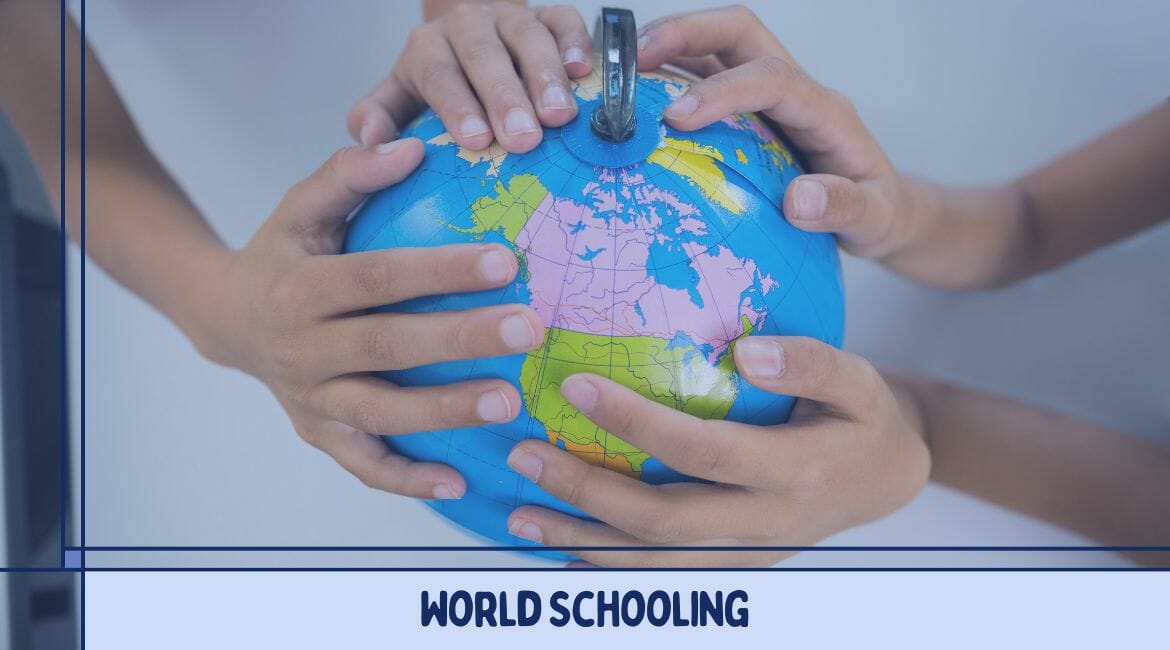In recent years, world schooling has become a popular way for homeschoolers to explore the world while learning. World schooling combines travel with learning and allows students to explore different countries and cultures while also taking part in hands-on educational experiences. But what exactly is world schooling? Let’s take a closer look at this unique form of education.
What Is World Schooling
World schooling, also known as “world education” or “global education,” is a form of education in which children are taught and learn outside of a traditional school setting. This can involve traveling with their family, attending international schools or online schools, or participating in other educational programs or experiences while living in different countries or regions. World schooling allows students to immerse themselves in different cultures, languages, and environments, and to learn about the world in a more hands-on, experiential way. It can also provide opportunities for personal growth, self-reliance, and independence.
History of World Schooling
The World School started in January 2020, with the intention of creating a community for families who desire an alternative to the traditional schooling experience for their children.
Differences with the Traditional Schooling
World schooling involves traveling to different countries and experiencing a variety of cultures, while traditional schooling typically takes place in a single location.
World schooling allows for a high level of flexibility in terms of the curriculum and pace of learning, as families can tailor the child’s education to their children’s needs and interests. Traditional schooling tends to have a more structured curriculum and schedule.
World schooling may offer different opportunities for socialization than traditional schooling, as children may have fewer opportunities to interact with their peers on a regular basis.
World schooling can be more expensive than traditional schooling, as it involves travel and living expenses in addition to educational costs.
World schooling is typically unregulated, with families having a high level of control over their children’s education. Traditional schooling is subject to state and national regulations and standards.
The Benefits Of World Schooling

Cultural Immersion and Understanding
World schooling allows children to immerse themselves in different cultures and languages, and to learn about the world in a more hands-on, experiential way. It can also help them develop a greater appreciation and understanding of diversity and global issues.
Personal Growth and Independence
Traveling and living in different parts of the world can help children develop self-reliance, adaptability, and independence. It can also expose them to new and challenging situations, which can help them grow and develop as individuals.
Experiential Learning
Experiential learning is a form of education that emphasizes hands-on, real-life experiences as a way to learn. It can take many forms, such as volunteering, internships, or field trips, and can be a valuable supplement to traditional homeschooling curricula. They use this hand-on experiential learning to solidify knowledge. World schooling provides a unique opportunity for this learning, as children are exposed to a variety of cultures and ways of life, and can participate in activities that would not be possible in a traditional school setting. It can help children develop important skills such as problem-solving, communication, and critical thinking, and can be a powerful tool for personal and academic growth. Overall, experiential learning can be a key component of a successful world schooling experience and can provide children with a well-rounded and enriching education.
Educational Opportunities
World schooling can provide access to a variety of educational experiences and programs that may not be available in a traditional school setting. This can include learning from local experts or participating in unique cultural activities.
Flexibility
World schooling allows families to have more flexibility in their children’s education, and to tailor it to their individual needs and interests. It can also allow for a more relaxed and flexible schedule, which can be especially beneficial for families who travel frequently or have other commitments.
Family Bonding
World schooling can provide an opportunity for families to spend more time together and to have unique and enriching experiences as a family. It can also help strengthen family bonds and create lasting memories.
The Challenges Of World Schooling Families
Financial Constraints
World travel is not cheap, world schooling families may need to budget carefully or find ways to supplement their income while on the road.
Finding Suitable Accommodation
It can be difficult to find affordable and suitable accommodation in some countries, especially if you have specific needs or preferences.
Maintaining a Consistent Education
It can be challenging to maintain a consistent education while traveling and to ensure that children are receiving a high-quality education that meets their needs.
Cultural Differences
Adjusting to different cultures and ways of life can be challenging, and world schooling families may need to be flexible and open-minded in order to adapt to new environments.
Socialization
Children who are world schooling may miss out on some of the socialization opportunities that are available in traditional schools and may need to be proactive in finding ways to socialize and make friends while on the road.
Homeschooling Regulations
Different countries have different homeschooling regulations, and world schooling families may need to research and comply with these regulations in order to ensure that their children are receiving a legal education.
How To Do World Schooling
If you are interested in world schooling for your children, here are some steps you can follow. By following these steps, you can help ensure that your children have a rewarding and educational experience while world schooling:
Research and Plan
Start by researching different destinations and considering what you want your children to learn and experience while traveling. Look into the homeschooling regulations in different countries and make sure you are comfortable with the level of freedom and flexibility you will have in terms of your children’s education.
Set Goals
Determine what you hope to achieve through world schoolings, such as exposure to different cultures, languages, or educational opportunities. This will help you focus your travels and plan your itinerary.
Choose a Destination
Select a destination that aligns with your goals and budget. Consider factors such as the cost of living, safety, and the availability of educational resources and activities.
Plan Your Itinerary
Plan your route and activities in advance, taking into account your children’s education and interests. Look for opportunities for hands-on learning and cultural immersion, such as visiting museums, taking language classes, or volunteering.
Consider Your Accommodation
Look for accommodation that is safe, affordable, and comfortable for your family. This could be a short-term rental, a homestay, or a camping site.
Prepare Your Children
Help your children prepare for their travels by explaining what to expect and encouraging them to be open to new experiences. Encourage them to be respectful of different cultures and to take an active role in their own education.
Stay in Touch
Stay in touch with your family and friends while you are traveling and make sure you have access to reliable communication and the internet. This will help you stay connected and get support if you need it.
Keep Records
Keep records of your children’s education and achievements while traveling, as you may need to provide proof of their education if you return to your home country or enroll them in a traditional school.
How to Choose the Country
There are many countries that could be good destinations for world schooling, depending on your goals and preferences. Here are a few factors to consider when choosing a country:
Cost of Living
Some countries may have a lower cost of living than others, which can be especially important if you are planning to travel long-term.
Educational Resources
Look for countries that offer a variety of educational resources and activities, such as museums, libraries, and language classes.
Cultural Immersion
Choose a country where your children can immerse themselves in a new culture and learn about different ways of life.
Safety
Consider the safety and security of a country before deciding to travel there.
Language
If you want to focus on language learning, consider a country where the language is spoken widely.
Climate
Think about the climate and whether it will be suitable for your children’s needs.
Some Popular Destinations for World Schooling
Spain
Spain has a rich culture and a lower cost of living than some other European countries. It is also a great destination for language learning, with a variety of language schools and immersion programs available.
Costa Rica
Costa Rica is known for its natural beauty and diverse ecosystems, making it a great destination for nature-based learning. It also has a lower cost of living than some other countries in Central America.
New Zealand
New Zealand is known for its natural beauty and outdoor activities, making it a great destination for nature-based learning. It also has a strong education system and is considered a safe country.
Australia
Australia has a strong education system and a variety of cultural and educational resources, making it a good destination for world schooling. It is also a safe country with a high standard of living.
How to Finance World Schooling
Financing world schooling can be a challenge, as traveling and living abroad can be expensive. By being creative and resourceful, you can find ways to finance your world schooling journey and make it a reality. It may also be helpful to discuss your financing plans with a financial advisor or professional to ensure that you are making the most of your resources. Here are a few ways you can finance your world schooling journey.
Save Money
Start by setting a budget and saving as much money as you can before you leave. Look for ways to cut expenses and save on everyday expenses, such as eating out less and cooking at home.
Use Your Skills
Consider using your skills and expertise to generate income while on the road. This could include freelance work, teaching, or consulting.
Rent out Your Home
If you own a home, consider renting it out while you are away to help cover your expenses.
Use Credit Cards Wisely
Credit cards can be a useful tool for financing travel, but it’s important to use them wisely and pay off your balances in full each month to avoid accruing high-interest charges.
Look for Grants and Scholarships
There may be grants and scholarships available for families interested in world schooling. Look for opportunities through homeschooling organizations or educational travel companies.
Consider Crowdfunding
Crowdfunding platforms such as Patreon or GoFundMe can be a way to finance your world schooling journey through small donations from a large number of people.
Best Resources for World Schooling

There are many resources available to help families planning to world school. By leveraging these resources, you can get the support and information you need to plan and execute a successful world schooling experience for your family. Here are a few places you can start:
Online Learning Programs
Online learning programs can be a valuable resource for worldschooling families who are world schooling, as they offer a way to supplement traditional homeschooling curricula and provide access to educational resources and activities that may not be available in the local area. Online learning programs can range from individual courses or subjects to full-time virtual schools and can be tailored to meet the needs of different age groups and learning styles. Some online learning programs offer live, interactive classes, while others provide self-paced course materials that students can complete on their own schedule. Online learning programs can be a convenient and flexible way to enhance a world schooling education and can help ensure that children have access to a high-quality education while traveling.
Homeschooling Organizations
Homeschooling organizations can be a great resource for families interested in world schooling. Many organizations offer support and resources for homeschooling families, including information on homeschooling laws and regulations in different countries.
Educational Travel Companies
Educational travel companies specialize in organizing and facilitating educational travel experiences for families. They can be a great resource for finding activities and accommodations that align with your educational goals.
Online Communities
There are many online communities and forums dedicated to world schooling. You can choose one online community to join where you can connect with other families who are world schooling and share ideas and resources.
Books and Blogs
There are many books and blogs written by families who have experience with world schooling, which can provide valuable insights and inspiration for planning your own journey.
Social Media
Social media platforms such as Instagram and Facebook can be a great way to connect with other world schooling families and learn about different destinations and experiences.
How Does Unschooling Compare to World Schooling?
Unschooling and world schooling are two alternative educational approaches that vary in their focus and methods. While world schooling involves using global travel and experiences as a means to learn, an introduction to unschooling highlights a more child-led approach, emphasizing independence and curiosity. Both approaches cater to individualized learning, but the key distinction lies in the utilization of either a structured curriculum or a more flexible, interest-based framework.
Conclusion – World Schooling
As you can see, world schooling is an amazing opportunity for homeschoolers who want to explore the world while learning at the same time. Not only does it offer educational benefits but it also provides invaluable life lessons that can help prepare young people for success beyond the classroom walls. If you’re looking for an alternative way to teach your child about culture and history then perhaps consider giving world schooling a try!

